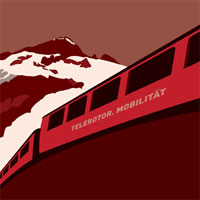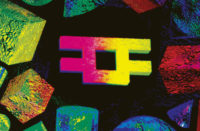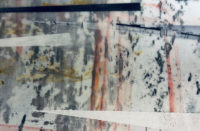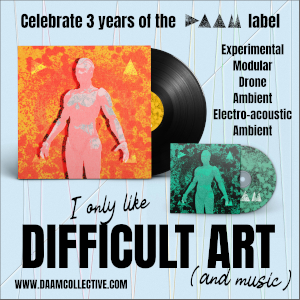
(04.27.05) Mobilität is consumed with the question of time and space.
Have we, in conquering the disparities of space brought about by
distances between villages, defeated time as well? Is it possible for
everything to be happening all at one in a global village?
Telepherique and Roger Rotor, collaborators living in different
physical spaces, consider the fleetness of time and the persistence of
motion in our perpetually moving 21st century lives with
Mobilität, an eleven track suite filled with the
persistent rhythms of trains. This is the Orient Express as a bullet
train powered by the thunder of a thousand ravers dancing throughout
the cars, their sweaty movements giving off the kinetic energy
necessary to power the massive electric batteries of the train.
“Non Stop” hums with the power of the engines churning beneath you,
while a train whistle is co-opted into a flute-like melody over a
120BPM rhythm that chugs along with an ecstasy-fueled “I think I can!
I think I can!” refrain. “Verwischte Konturen” disappears into a
tunnel, filling your head with the dissipating steel echo of the train
off the hewn stone walls of the underground passage. In the darkness,
you hear a hissing, whispering clatter of machinery; you are riding
the crest of a sound wave, the full sonic thunder of the train
magnified in the tunnel behind you, but only the whispering sign of
its headlong rush sits with you in the front car.
The record opens with “Gelatinedynamit,” a growing eruption of noise
that is the relentless sound of human progress as the trains are
brought to the mountains, huffing and puffing through rough tunnels.
The ground rumbles with the distant explosions as the blasting crews
carve their way through old stone. Telepherique builds a dark
soundtrack to the tumultuous progress of mankind as we demolish the
distances between stations, laying rails and bringing the fast trains.
The “Risan” clatters into the station, opening its doors and sucking
in a station full of passengers. The voices of children echo in the
empty cars as the doors begin to seal shut in a concerto of expressed
air. The engines begin to hum, their pistons pumping and their rotors
flying. Roger Rotor is the conductor and he opens the throttle wide,
shooting the train out of the station before the doors are finished
closing.
Why did life become speed-oriented? Why did we enslave ourselves with
time tables and schedules and hourly appointments to which we are
constantly late? Mobilität considers the rhythm of speed
and wonders if there is there more to mobility that just destroying
the distinctions of time and space. The answer, resoundingly, is
“Yes!” We are like sharks. We must move or die. Occasionally, we
happen to find an excuse to dance.
Mobilität is leaving the station now on Ant-Zen.






















